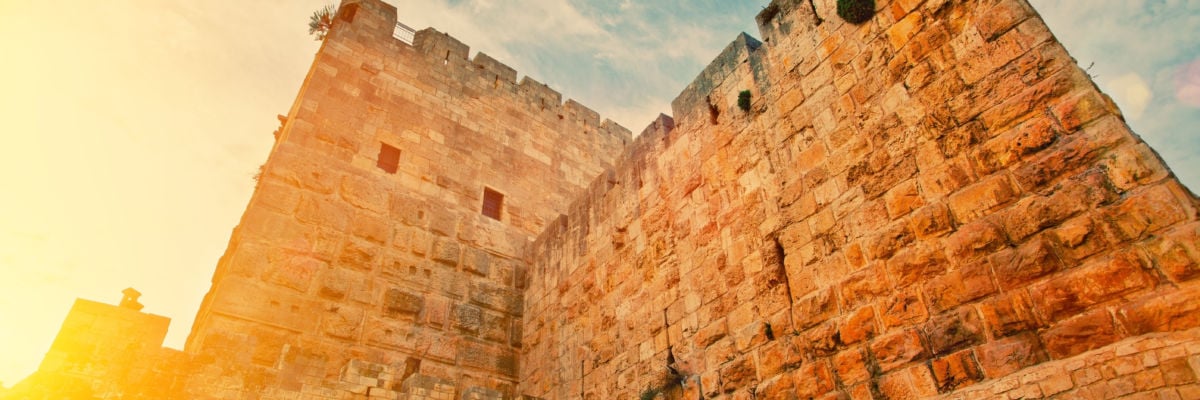
In my Father’s house are many rooms; if it were not so, would I have told you that I go to prepare a place for you? And when I go and prepare a place for you, I will come again and will take you to myself, that where I am you may be also (John 14:2-3).
I have to begin today with a moment to marvel over the rich sweetness of Scripture. How many times have I heard this passage and understood it as a beautiful and encouraging description of heaven? Probably many of you have heard the same. And this is indeed one aspect of the Lord’s teaching here. But there’s even more to it.
First, let’s notice the teaching in the epistle passage from 1 Peter before considering how this might influence our reading of John 14. In this rightly famous passage, St. Peter gives a stunning description of the Church: “Like living stones be yourselves built into a spiritual house, to be a holy priesthood, to offer spiritual sacrifices acceptable to God through Jesus Christ” (1 Pet. 2:5). For Peter, the Church is the perfect embodiment of the claims God first makes for Israel at Sinai (Exod. 19:5-6): “a chosen race, a royal priesthood, a holy nation, God’s own people, that you may declare the wonderful deeds of him who called you out of darkness into his marvelous light. Once you were no people but now you are God’s people; once you had not received mercy but now you have received mercy” (2:9-10). Just as God called the people of Israel out of the darkness of the nations to reveal his glory to the world, so God has called us into fellowship with Jesus, the new Israel, the new royal high priest, who perfects this identity and brings it to its true end.
Note, if you will, the building imagery. “Be built,” Peter says, “like living stones.” For so many medieval commentators, a church building is full of signs, starting with the very structure of the walls. Although we might need at times to remember that the church is not a building but a people, in the New Testament these two images are not in competition. We call church buildings “churches” not from some distortion of the theological tradition but out of recognition that the building is a sign of the people who are themselves a holy building, a structure built up for the praise and glory of God.
Peter’s language is of course unintelligible from the context of the Temple at Jerusalem. The Temple was, for pious Jews, the dwelling place of God. Yet Jesus himself has become the new Temple. Jesus is himself a building in which God and his people can dwell together in unity.
And this brings us back to John 14. “And if I go and prepare a place for you, I will come back again and take you to myself, so that where I am you also may be” (vs. 3). Is Jesus just talking about heaven? Well, he’s not not talking about heaven. But Catholics believe that it is possible to experience heaven even on earth, in that we can attain, even here, a kind of fullness in our relationship with God. This is ultimately the goal of justification—that the vision of God, the fellowship with God, that we begin in this life will continue even more fully and permanently in the next.
More pointedly, “My Father’s house” is, elsewhere in the Gospels, a direct reference to the Temple. The Father’s “house” is not in the first instance some dwelling place in the eschatological distance, but a place where even now we can seek fellowship with God. And this place will be better than the Temple. For in this new dwelling place, we can stay. It won’t be just a place to visit, but a place to live.
And, if we may combine John and Peter, the holy nation and royal priesthood inhabiting this new dwelling place will do “greater works than these.” What could Jesus possibly mean by that? We can read it in two ways. One, with the background of the Temple, there’s the implication that the new Temple and its sacrifices will be greater than the old. Two, in reference to the “works” of Jesus, the sacraments of the new covenant will be greater even than the miracles he had accomplished thus far in his public ministry.
Many writers in the tradition have commented that even the resurrection of Lazarus pales in comparison to the grace of the sacraments. And what happens in the sacraments? In baptism and in the sacrament of penance, the transformation of death into life. In the Eucharist, the transformation of mere bread and wine into the body and blood of God. This is what Jesus means: I cured blindness and bodily sickness and death. You I will empower to heal the spiritual blindness, the spiritual sickness, and the spiritual death of the world now and even to the end of time.
Further: I will come back again and take you to myself. We know the eschatological reference to the second coming and the general resurrection. But even now, in the sacraments, Jesus comes back to us constantly; through the grace of his presence he incorporates us more and more fully into his life.
We cannot emphasize this point enough. The sacraments are a preparation for heaven—and not in some extrinsic way, like a kind of temporal fuel that gets us where we need to go. Rather, the Lord changes us. Our humanity is purified and elevated so that we are capable of entering the life of heaven. We are so often tempted to demand, like Philip, “Lord, show us the Father and that will be enough for us.” But we can only see the Father through the Son. And we can only see the Son in the ways that he has chosen to share himself.
This is another way of putting that classical axiom extra ecclesia nulla salus—“no salvation outside the Church”—which isn’t so much an automatic condemnation of those outside the Church’s visible boundaries as it is an insistence that we do not call down or invent Jesus on our own terms. He comes to us and invites us into his Father’s house. If we want to reach at last that heavenly mansion and its many rooms, we have to enter it now, while the entrance is open. And once we do, in the waters of baptism, and in the feast of the holy Eucharist, the Lord, like a good host, will provide everything we need so that, in the last day, we can find that we have in fact found our home.



